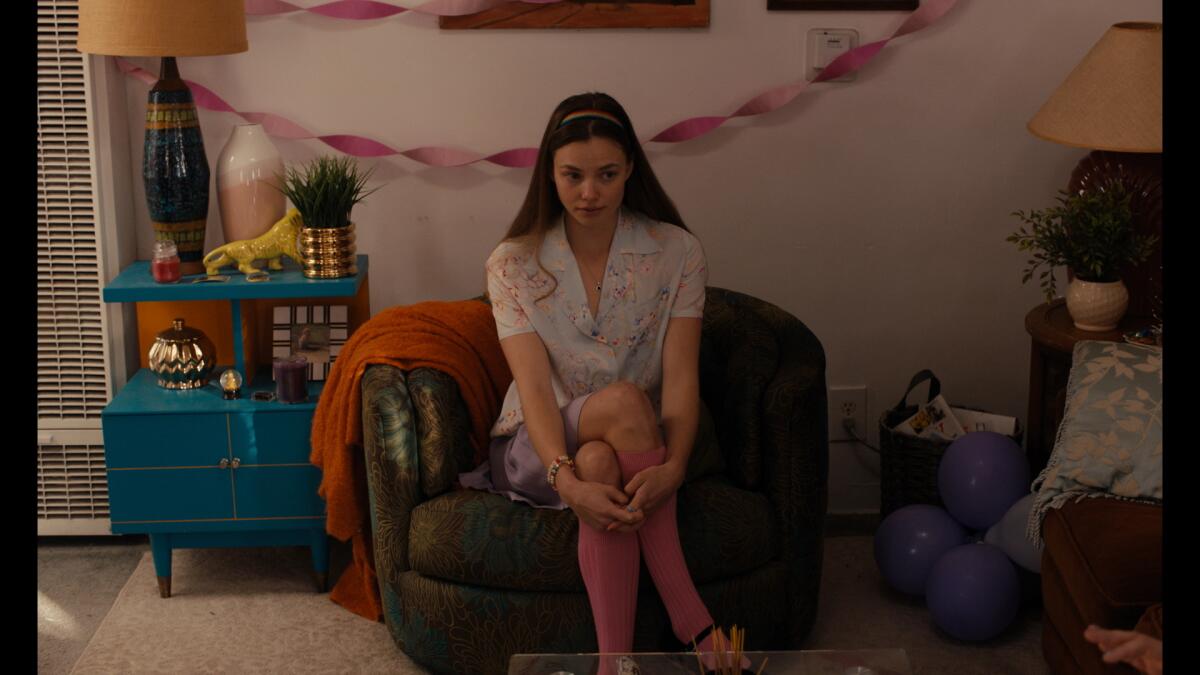Review: Succeeding as often as it stumbles, ‘Sharp Stick’ marks the return of Lena Dunham

- Share via
Twelve years after her breakthrough 2010 indie darling “Tiny Furniture,” New York-born writer, director, producer and actor Lena Dunham returns to feature filmmaking with “Sharp Stick,” a similarly intimate and vulnerable coming-of-age sex comedy. Dunham’s newest follows Sarah Jo (Kristine Froseth), a 26-year-old home care aide living on the edges of Hollywood with her mother, Marilyn (Jennifer Jason Leigh), and sister Treina (Taylour Paige).
Sarah Jo’s family is women-centered and sexually open, with five-time divorcée Marilyn and adopted sister and flirtatious TikTok-er Treina often shaping the family’s conversations on sex, men and desirability. Despite this, the young woman is emotionally stunted when it comes to matters of intimacy; not only does she look childlike in her appearance and self-fashioning (she wears prairie dresses, light-up sneakers, pinafores and modest ruffled nightgowns) but she is also unsure and underdeveloped when it comes to navigating her own sexuality.
For your safety
The Times is committed to reviewing theatrical film releases during the COVID-19 pandemic. Because moviegoing carries risks during this time, we remind readers to follow health and safety guidelines as outlined by the CDC and local health officials.
This is why it is all the more remarkable when — hoping to lose her virginity — she enters into a sexual relationship with Josh (Jon Bernthal), the loving father of her young home aide charge, Zach (Liam Michel Saux). Despite Josh’s superficial charms, it is clear from the outset that he is a perennial man-child. His pregnant wife, Heather (Dunham), only weeks from giving birth, is the family’s breadwinner and leaves the home every morning in a gust of stress and anxiety. Josh is seemingly unemployed and quick to shrug off Heather’s valid concerns with the kind of boyish charm that is utterly frustrating for anyone who has experienced it themselves but wholly alluring to the inexperienced Sarah Jo. He is, in his own words, “like … a loser.”
Dunham is deft in her characteristic ability to shape an easy yet complex orbit for these three characters. The pleasure in watching Josh, Sarah Jo and Heather onscreen comes not only from Dunham’s talent for writing and filming wonderfully expansive moments of intimacy between Josh and Sarah Jo, but also in the way she opens up space for all three of their interior lives to fully tangle and inevitably contradict and contend with one another. We are able to reflect on the ugly and uncomfortable as well as the exciting and romantic, the humorous and joyful as well as the disheartening and shameful, with the understanding that one set of experiences cannot materialize without the other.
This forms only one half of Dunham’s film, however, with the second half of “Sharp Stick” devoting itself to Sarah Jo’s almost semantic ambition to learn and experience more of her sexuality as she continues to understand it. Her self-education is frank and without metaphor, and, in its earlier stages, shaped by the world around her rather than through any sort of autonomous sexual desire. It is in these later movements of the film that Sarah Jo’s childlike characterization feels most disconcerting.
The infantilization of Sarah Jo is never fully developed within “Sharp Stick”; she exists as she is and — outside of the film’s welcome tonal and thematic elements — we are never fully sure why. There is no history to this reality, only a present; in many ways, Sarah Jo’s character is coded as neurodivergent (although Dunham has been quick to refute this) in a way that further problematizes this lack. Alongside this lives the positioning of her sexuality in comparison to sister Treina (played by a Black actor), which carries with it worrying racial implications that feel wholly unacknowledged by the film. There is certainly a white imaginary at work here, even if Dunham cannot see it for herself.
These issues don’t exist outside the film but feel innate to the patterning of “Sharp Stick” as a whole. The film itself feels as if it has emerged fully formed from the mind of its author, for better and for worse. It is a study of women’s sexuality, desire and autonomy that succeeds just as much as it stumbles, a method of feminist storytelling that privileges the pursuit of desire over an evenness of narrative. It cares not for the customary but instead for the messiness of real life, which here is inextricable from its own means. Above all, it speaks to the way that Dunham has continued to craft work that exists as many things — complex or naive, angering or pleasurable — out of kernels of her own experience.
‘Sharp Stick’
Rated: R, for strong sexual content, some nudity, language throughout and drug use
Running time: 1 hour 26 minutes
Playing: Starts July 29, Landmark Nuart; available Aug. 16 on digital and VOD
More to Read
Only good movies
Get the Indie Focus newsletter, Mark Olsen's weekly guide to the world of cinema.
You may occasionally receive promotional content from the Los Angeles Times.









